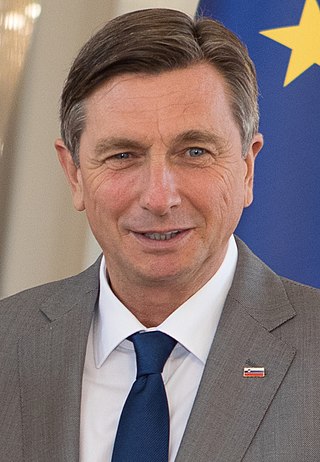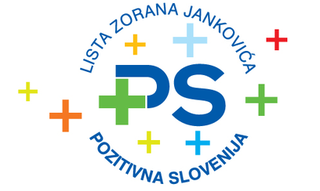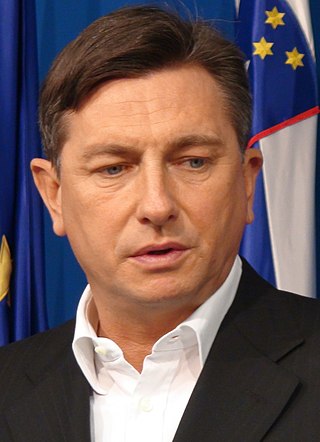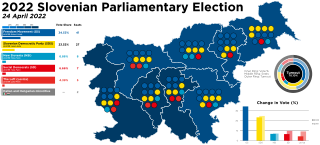Same-sex marriage in France has been legal since 18 May 2013, making France the thirteenth country worldwide to allow same-sex couples to marry. The legislation applies to metropolitan France as well as to all French overseas departments and territories.

The Social Democrats is a centre-left and pro-European social-democratic political party in Slovenia led by Tanja Fajon. From 1993 until 2005, the party was known as the United List of Social Democrats. It is the successor of the League of Communists of Slovenia. As of 2022, the party is a member of a three-party coalition government with Robert Golob's Freedom Movement alongside The Left, as well as a full member of the Party of European Socialists and Progressive Alliance.

Borut Pahor is a Slovenian politician who served as President of Slovenia from 2012 to 2022. He previously served as Prime Minister of Slovenia from November 2008 to February 2012.
Same-sex marriage in Slovenia has been legal since 9 July 2022 in accordance with a ruling from the Constitutional Court of Slovenia. The court ruled that the ban on same-sex marriages violated the Constitution of Slovenia and gave the Slovenian Parliament six months to amend the law to align with the ruling, although the decision took effect immediately. The National Assembly passed legislation on 4 October 2022, which was overridden by the National Council one week later, but reconfirmed with a final vote in the National Assembly on 18 October 2022.
Estonia has recognised same-sex registered partnerships since January 1, 2016. These unions provide same-sex couples with some of the rights, benefits and obligations of marriage.
Same-sex marriage in Washington has been legally recognized since December 6, 2012. On February 13, 2012, Governor Christine Gregoire signed legislation that established full marriage rights for same-sex couples in the state of Washington. Opponents mounted a challenge that required voters to approve the statute at a referendum, which they did on November 6. The law took effect on December 6, and the first marriages were celebrated on December 9. Within a couple of days, more than 600 marriage licenses were issued to same-sex couples in King County alone.

Lesbian, gay, bisexual, and transgender (LGBT) rights in Slovenia have significantly evolved over time. Slovenia is the first and currently the only post-communist and Slavic country to legalise same-sex marriage.

Gregor Virant is a Slovenian politician and public servant. Between 2004 and 2008, he served as Minister of Public Administration in Janez Janša's first government, between 2011–2013 he was Speaker of the National Assembly of Slovenia. He also served as Minister of the Interior and Public Administration in the government of Alenka Bratušek between 2013 and 2014.
The Archives of the Republic of Slovenia (ARS) are the national archives of Slovenia. They were created in 1945, but have their origins in 1773. They are supervised by the Slovenian Ministry of Culture. They are located in the Gruber Palace in Ljubljana, the capital of Slovenia. Since March 2012, the archive's executive director has been Jože Dežman, who replaced Dragan Matić.

Parliamentary elections were held in Slovenia on 4 December 2011 to elect the 90 deputies of the National Assembly. This was the first early election in Slovenia's history. The election was surprisingly won by the center-left Positive Slovenia party, led by Zoran Janković. However, he failed to be elected as the new Prime Minister in the National Assembly, and the new government was instead formed by a right-leaning coalition of five parties, led by Janez Janša, the president of the second-placed Slovenian Democratic Party. The voter turnout was 65.6%.

Positive Slovenia was a centre-left political party in Slovenia, following April 2014 led by founder Zoran Janković. The party was founded under the name Zoran Janković's List – Positive Slovenia. It was renamed to Positive Slovenia in its second congress, held on 21 January 2012.
Civic List is an inactive classical-liberal extra-parliamentary political party in Slovenia, led by Gregor Virant. LGV won 8.37% of the vote at the early 2011 Slovenian parliamentary election on 4 December 2011, thus gaining 8 seats in the National Assembly. After a quit of its deputy group by one of its deputies in April 2012, it has had 7 seats. Until April 2012 the party was named Gregor Virant's Civic List.

Presidential elections were held in Slovenia on 11 November 2012, with a run-off held on 2 December 2012. Slovenia's 1.7 million registered voters chose between the incumbent president Danilo Türk, the SDS/NSi party candidate Milan Zver and Borut Pahor of the Social Democrats who was also supported by the Civic List. The first round was won, contrary to the opinion poll predictions, by Pahor, with Türk placing second. In the run-off election, Pahor won with roughly two-thirds of the vote.

A referendum on a bill legalising same-sex marriage was held in Slovenia on 20 December 2015. The bill was rejected, as a majority of voters voted against and the votes against were more than 20% of registered voters.
Presidential elections were held in Slovenia on 22 October 2017. Nine candidates ran in the first round of the elections, in which the incumbent independent President Borut Pahor placed first and Marjan Šarec of the List of Marjan Šarec (LMŠ) placed second. No candidate received a majority of the vote in the first round, resulting in a run-off between Pahor and that was held on 12 November 2017. Pahor won the run-off with 53% of the vote; voter turnout in the second round was 42.13%, the lowest in any presidential election since independence.
Events in the year 2017 in Slovenia.

The Voice for Children and Families is a right-wing Slovenian political party. The party was founded on 25 March 2017 by Aleš Primc and Metka Zevnik as an electoral arm of a movement of which they are also leaders of, the Movement for Children and Families, the initial purpose of which was to overturn a law passed by the National Assembly which would recognize same sex marriage in the Republic of Slovenia.

Parliamentary elections were held in Slovenia on 24 April 2022 to elect all 90 members of the National Assembly.
Resni.ca[rɛsnìːt͡sa] is a Slovenian political party, founded on 14 January 2021, and led by Zoran Stevanović. The party organized protests against the introduction of the "recovered, vaccinated, tested" measure for limiting the COVID-19 pandemic, which contributed to its visibility. The party's stated central issues are fighting corruption, national sovereignty, reducing taxes, opposition to COVID-19 pandemic lockdown measures, and reducing budget deficits and public debt.
In the run up to the next Slovenian parliamentary election, various organisations carry out opinion polling to gauge voting intention in Slovenia. Results of such polls are displayed in this article.










